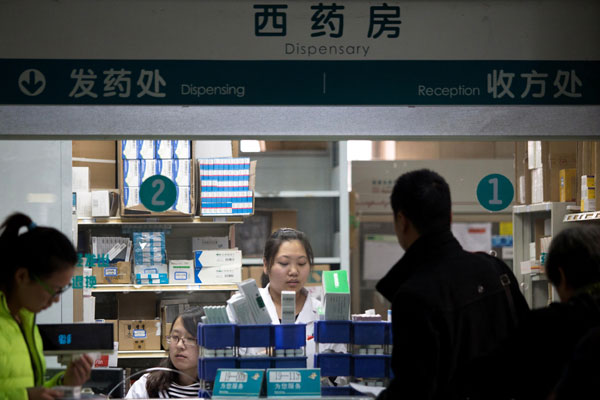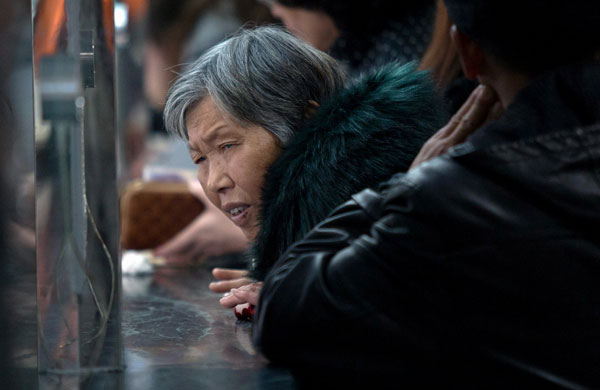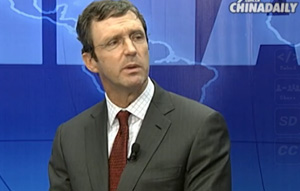Policy to bring medical benefit for rural poor
Updated: 2013-11-28 09:41
By Zhao Xu (China Daily)
|
||||||||
'Hometown hukou'
In the face of this administrative nightmare, Wang Ningli, deputy director of the Beijing Tongren Hospital, the country's most prestigious eye hospital, offered what he believed to be a radical and fundamental solution.
 |
|
Patients at the pharmacy in Beijing Tongren Hospital. Mao Yanzheng / China Daily |
"In the case of migrant workers, I strongly recommend that their adopted hometown gives them the same insurance cover as regular urban citizens, on condition that they have worked there for a relatively long and continuous period of time," he said. "Failure to do this amounts to a form of discrimination."
"As for the problems long inflicted on Chinese peasants by the less-than-equitable healthcare policy, the cross-provincial reimbursement plan would only provide an analgesic, not a cure," Wang continued. "In the short term, it might serve to ease growing social tensions by turning down the volume of complaints, but in the long term, it risks creating more problems than the government could ever imagine or solve."
 |
|
Patients at the cashier's booth at Beijing Tongren Hospital. Mao Yanzheng / China Daily |
In other words, the plan may represent treacherous waters for policy makers, while providing little more than nominal benefit to those it is intended to help - the impoverished and neglected.
One fatal drawback, according to Wang, is the potential devastation of the already threadbare healthcare delivery system in the vast rural areas, coupled with the growing burden on overused hospitals in the cities. "If realized, the plan would channel vast numbers of people from far away to places like ours," he said, pointing to a corridor filled with parcels and backpacks left by patients who had arrived at the hospital straight from the railway station. "The immediate effect would be a compromised service, where each patient is allocated five minutes and no more."
That's unlikely to be the only disadvantage, because other factors would come into play, according to Liu. "Do you really think that those farmers, whose identity is obvious from their wind-whipped, deep-furrowed faces, would get the same treatment as wealthier, well-turned-out patients who think nothing of handing doctors a handsome amount of 'thank you' money?" he asked. "They would almost certainly face a longer wait for surgery or tests and in the meantime they would just exhaust the funds they've saved for a possible cure."
Reflecting on his recent journey to Gansu, one of China's least-developed provinces, Liu said the reimbursement plan won't lessen wealth-based healthcare inequality, but exacerbate it. "Believe me, the people who'll make the most of the new policy are those with the financial means and who happen to live outside the major cities," he said. "In the mountain village I have just visited, the local people almost never leave, no matter if they are ill or not. Why? Because they can't afford the travel tickets."
Most Viewed
Editor's Picks

|

|

|

|

|

|
Today's Top News
Biden’s China trip has broad agenda
Premier carries hectic schedule
China to be largest oil importer
Clean energy fueling the future
Ancient Chinese philosophies are eye-opening
Tencent anti-monopoly suit trial starts in Beijing
US B-52 bombers in air zone monitored
Court rejects appeal of military singers' son
US Weekly

|

|













